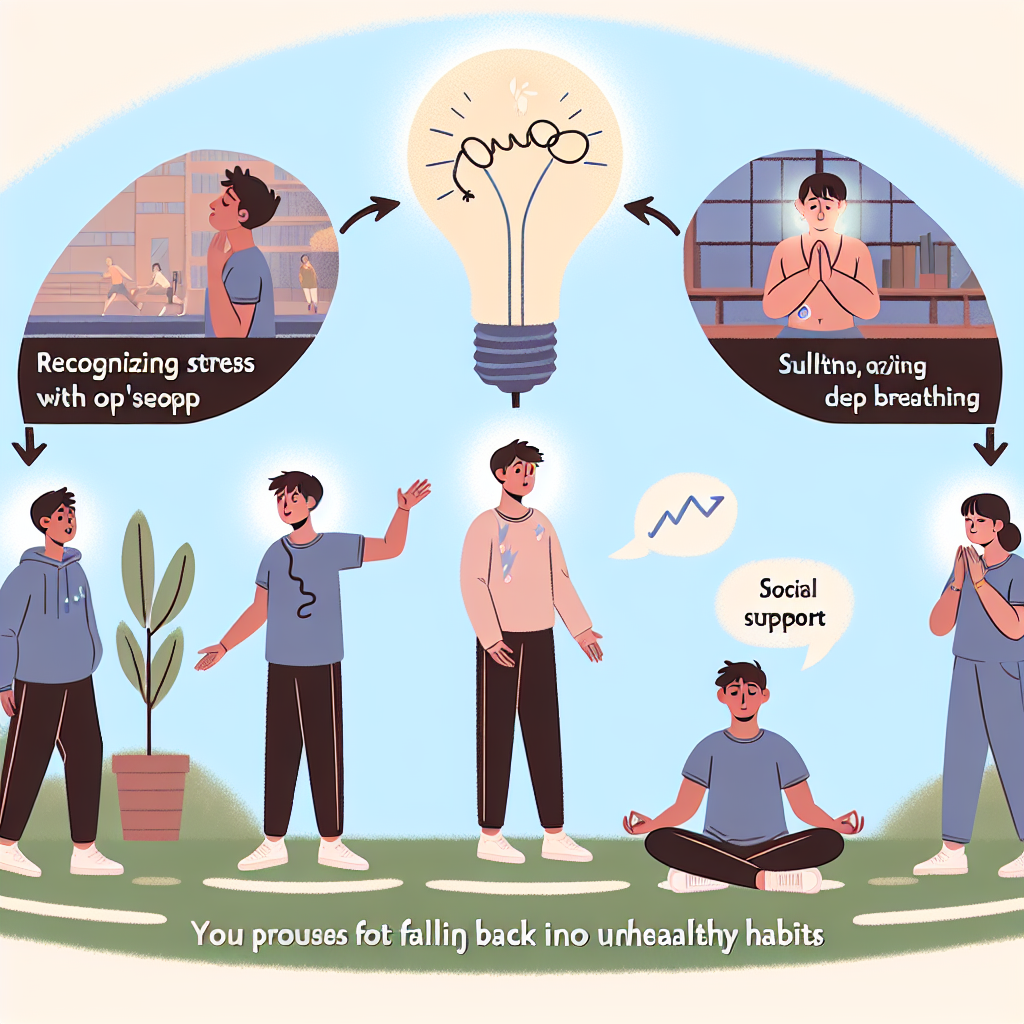-
Table of Contents

“Master Your Mind: Stress Management Without Setbacks”
Introduction
Managing stress without relapsing is a critical skill, especially for individuals recovering from addiction or other mental health challenges. Stress is an inevitable part of life, but how one handles it can significantly impact their well-being and recovery journey. Effective stress management involves a combination of strategies that promote physical, emotional, and mental health. These strategies include developing healthy coping mechanisms, maintaining a balanced lifestyle, seeking support from others, and practicing mindfulness and relaxation techniques. By implementing these approaches, individuals can navigate stressful situations without falling back into harmful patterns, thereby supporting their long-term recovery and overall quality of life.
Techniques for Managing Stress Without Relapsing: A Comprehensive Guide
Managing stress is a crucial aspect of maintaining overall well-being, especially for those who are in recovery from addiction. The journey to sobriety is often fraught with challenges, and stress can be a significant trigger for relapse. However, with the right techniques, it is possible to navigate stressful situations without falling back into old habits. One of the most effective ways to manage stress is through mindfulness and meditation. These practices encourage individuals to stay present in the moment, reducing anxiety about the future and regrets about the past. By focusing on the here and now, it becomes easier to handle stressors as they arise, without feeling overwhelmed.
In addition to mindfulness, physical activity plays a vital role in stress management. Exercise releases endorphins, which are natural mood lifters. Whether it’s a brisk walk, a yoga session, or a more intense workout, incorporating regular physical activity into your routine can significantly reduce stress levels. Moreover, exercise provides a healthy outlet for releasing pent-up energy and emotions, which might otherwise lead to relapse. Alongside physical activity, maintaining a balanced diet is equally important. Nutrient-rich foods can help stabilize mood and energy levels, making it easier to cope with stress.
Another essential technique is developing a strong support network. Surrounding yourself with positive influences, whether they are friends, family, or support groups, can provide a sense of community and belonging. These connections offer emotional support and practical advice, helping you navigate stressful situations without resorting to substance use. Additionally, talking about your feelings with someone you trust can be incredibly therapeutic, providing relief and perspective.
Time management and organization are also key components in managing stress. By setting realistic goals and breaking tasks into manageable steps, you can avoid feeling overwhelmed. Prioritizing tasks and setting aside time for relaxation and self-care can create a balanced routine that minimizes stress. Furthermore, learning to say no and setting boundaries is crucial. Overcommitting can lead to burnout, so it’s important to recognize your limits and protect your time and energy.
Engaging in hobbies and activities that bring joy and relaxation can also be a powerful way to manage stress. Whether it’s painting, reading, gardening, or playing a musical instrument, finding activities that you enjoy can provide a much-needed escape from daily pressures. These activities not only offer a distraction but also contribute to a sense of accomplishment and fulfillment.
It’s also beneficial to practice gratitude. Taking time each day to reflect on the positive aspects of your life can shift your focus away from stressors and foster a more optimistic outlook. Keeping a gratitude journal, where you write down things you are thankful for, can be a simple yet effective way to cultivate this habit.
Lastly, seeking professional help when needed is a sign of strength, not weakness. Therapists and counselors can provide valuable tools and strategies for managing stress and preventing relapse. They can offer a safe space to explore underlying issues and develop coping mechanisms tailored to your specific needs.
In conclusion, managing stress without relapsing requires a multifaceted approach that includes mindfulness, physical activity, a balanced diet, a strong support network, effective time management, engaging hobbies, practicing gratitude, and seeking professional help when necessary. By incorporating these techniques into your daily life, you can build resilience and maintain your sobriety, even in the face of stress. Remember, the journey to recovery is ongoing, and every step you take towards managing stress is a step towards a healthier, more fulfilling life.
Mindfulness Practices to Prevent Relapse During Stressful Times
Managing stress is a crucial aspect of maintaining overall well-being, especially for those who are in recovery from addiction. Stressful times can often trigger a relapse, making it essential to adopt effective mindfulness practices that can help prevent this from happening. By integrating mindfulness into daily routines, individuals can cultivate a sense of inner peace and resilience, which can be instrumental in navigating life’s challenges without falling back into old habits.
One of the most effective mindfulness practices is meditation. Meditation allows individuals to center themselves, focusing on the present moment rather than getting lost in the chaos of stressful thoughts. By setting aside just a few minutes each day to meditate, one can develop a greater awareness of their thoughts and emotions, making it easier to manage stress without resorting to substance use. Guided meditations, which are readily available through various apps and online platforms, can be particularly helpful for beginners who may find it challenging to quiet their minds.
In addition to meditation, practicing deep breathing exercises can be a powerful tool in managing stress. Deep breathing helps activate the body’s relaxation response, reducing the levels of stress hormones and promoting a sense of calm. Techniques such as diaphragmatic breathing, where one breathes deeply into the belly rather than shallowly into the chest, can be practiced anywhere and at any time. This makes it a convenient and effective way to manage stress on the go.
Another mindfulness practice that can prevent relapse during stressful times is mindful movement. Activities such as yoga, tai chi, and even mindful walking can help individuals stay grounded and connected to their bodies. These practices not only promote physical health but also encourage a mindful awareness of the present moment. By focusing on the sensations of movement and breath, individuals can create a mental space that is free from the distractions of stress and anxiety.
Journaling is another valuable mindfulness practice that can help individuals process their thoughts and emotions. By writing down their experiences, individuals can gain insights into their stressors and triggers, making it easier to develop strategies for coping with them. Journaling can also serve as a form of emotional release, allowing individuals to express their feelings in a safe and constructive manner. Over time, this practice can lead to greater self-awareness and emotional resilience.
Incorporating mindfulness into daily routines can also involve simple practices such as mindful eating and mindful listening. Mindful eating involves paying full attention to the experience of eating, savoring each bite, and being aware of the body’s hunger and fullness cues. This practice can help individuals develop a healthier relationship with food and reduce stress-related eating. Similarly, mindful listening involves fully engaging with others during conversations, which can enhance relationships and reduce feelings of isolation and stress.
It is important to remember that mindfulness is a skill that takes time and practice to develop. Being patient with oneself and consistently practicing these techniques can lead to significant improvements in managing stress and preventing relapse. By embracing mindfulness, individuals can create a strong foundation of inner peace and resilience, empowering them to face life’s challenges with confidence and grace. Ultimately, mindfulness practices offer a pathway to a healthier, more balanced life, free from the grip of addiction.
Q&A
1. **Question:** What are some effective stress management techniques to avoid relapse?
**Answer:** Effective stress management techniques include regular physical exercise, practicing mindfulness meditation, maintaining a healthy diet, getting adequate sleep, engaging in hobbies, and seeking support from friends, family, or support groups.
2. **Question:** How can one identify and avoid triggers that may lead to relapse during stressful times?
**Answer:** To identify and avoid triggers, one can keep a journal to track stressors and emotional responses, develop a strong support network, create a structured daily routine, avoid high-risk situations, and practice coping strategies such as deep breathing exercises and positive self-talk.
Conclusion
To manage stress without relapsing, it is crucial to develop healthy coping mechanisms such as regular physical exercise, mindfulness meditation, and maintaining a balanced diet. Establishing a strong support network, whether through friends, family, or support groups, can provide emotional stability. Setting realistic goals and breaking tasks into manageable steps can reduce feelings of being overwhelmed. Additionally, practicing good sleep hygiene and seeking professional help when necessary can further bolster resilience against stress. By integrating these strategies into daily life, individuals can effectively manage stress and reduce the risk of relapse.



